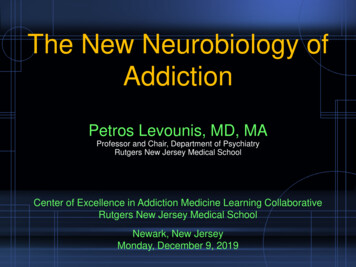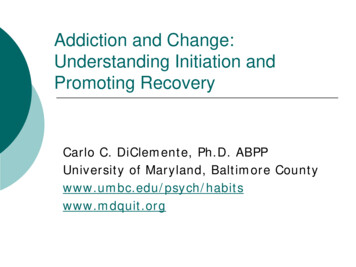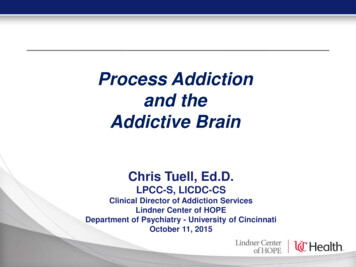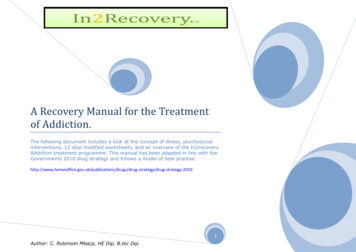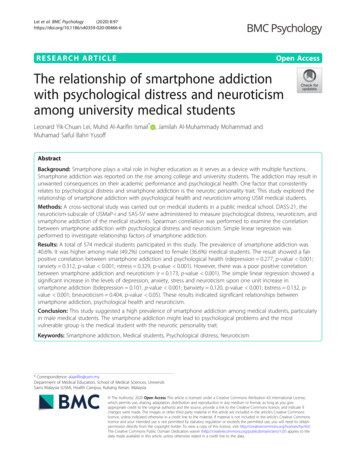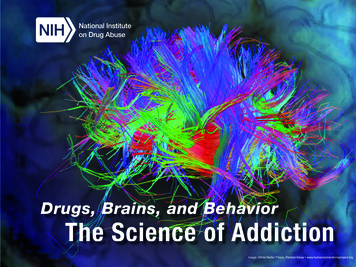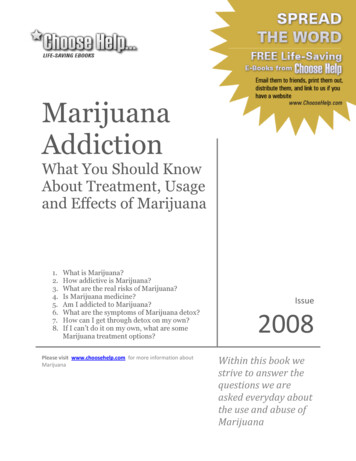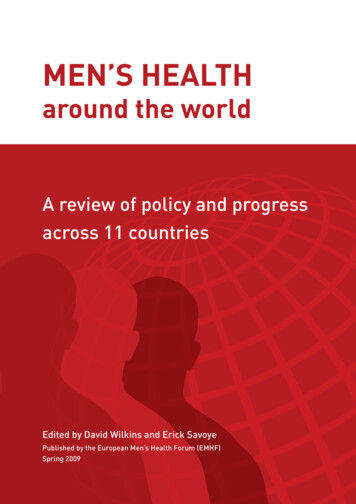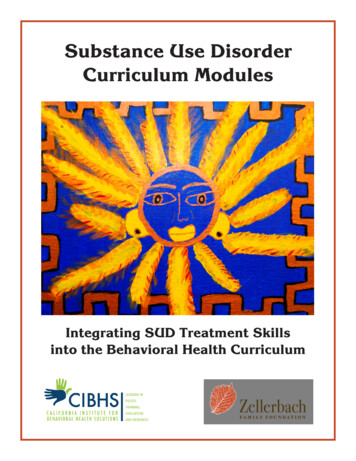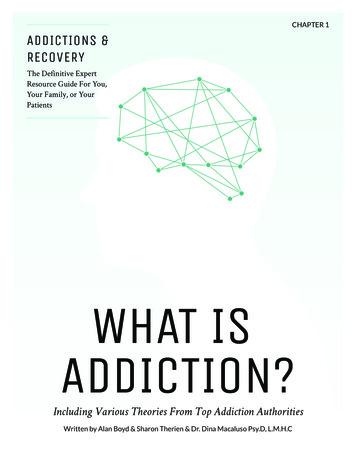
Transcription
CHAPTER 1ADDICTIONS &RECOVERYThe Definitive ExpertResource Guide For You,Your Family, or YourPatientsWHAT ISADDICTION?Including Various Theories From Top Addiction AuthoritiesWritten by Alan Boyd & Sharon Therien & Dr. Dina Macaluso Psy.D, L.M.H.C
ADDICTIONS & RECOVERY WHAT IS ADDICTION?WHAT IS ADDICTION?Everyone has a basic idea of what addiction is, yet it’s a complex andinvolved topic that goes far beyond common knowledge.Nonetheless, it’s worth delving deeper to learn more about addiction if you orsomeone you know is affected by it – or if you’re trying to determine whetherthe person does in fact have an addiction.Arguably, you could be addicted to different kinds of activities, but this guiderefers directly to an addiction to substances, whether to drugs or alcohol.WHAT IS ADDICTION?If you start researching what addiction is, you will notice disparate definitions and theories onthe cause of addiction across various professionals and fields. Different people and groups see itas one of the following:A medical diseaseA psychologicalstateA behavioralproblemwww.lumierehealingcenters.com01A social orexperiential issue
ADDICTIONS & RECOVERY WHAT IS ADDICTION?Nonetheless, a common thread between viewpoints seems to be that a person is consideredaddicted when he is either unable or unwilling to stop using the substance. He continues to usethe substance even when it is causing consequences in his life – he may or may not be aware ofthis cause and effect relationship.SIGNS AND SYMPTOMS OF ADDICTIONCertain signs and symptoms are associated with addiction to a substance:1.Less ControlOne of the main signs you might notice is that you or your loved one has less control over theuse of drugs or alcohol. So you might be addicted if you are using a substance more or for alonger period of time than you meant to. Maybe you even decided that you were going to cutback or stop, but that didn’t happen.2.Physical SymptomsVarious physical symptoms can show themselves. For example:Substances can alter your appearance.An addiction can make you focus less on your personal hygiene and looks.Your body can become tolerant to a substance so you no longer get the same effectsunless you have more of the drug or alcohol.If you do decide to stop using your substance of choice, you go through withdrawaleffects that could include irritability, trouble sleeping, sweating and other symptoms.www.lumierehealingcenters.com02
ADDICTIONS & RECOVERY WHAT IS ADDICTION?3.Behavioral ChangesIt’s also likely for you to change your behaviors if you are addicted. You might not spend asmuch time as you previously had on certain activities, including:WorkFamily timeHobbiesInstead, getting and using your chosen substance takes precedence over these activities. Youmight spend time hiding your drug use or related aspects such as how much you used or whereyou went. And you might also end up engaging in risky behaviors to get your drug or becauseyou’re on a substance.4.Additional SignsThere are various other signs and symptoms associated with both drug abuse and drugaddiction, which include:Mood changesChanges in your eating habitsIsolating yourselfTalking quickly or erraticallyWHAT CAUSES ADDICTION?As previously mentioned, various theories exist on how and why addiction starts. What aresome of the prevalent viewpoints on addiction?www.lumierehealingcenters.com03
ADDICTIONS & RECOVERY WHAT IS ADDICTION?Addiction as a DiseaseOne idea that’s generally accepted in the medical field is that addiction is adisease that involves your brain. If you have an addiction, this viewpointfollows the idea that you are not capable of simply quitting, but instead needmedical help to manage the disease.The definition for addiction on the National Institute on Drug Abuse website follows thismodel, saying that addiction alters the brain’s functioning. In addition, the institute explainsthat these changes to the brain can lead to various mental concerns, including mood swingsand difficulty with decision-making.The American Society of Addiction Medicine, or ASAM, website goes deeper into thisviewpoint, explaining that this chronic disease involves dysfunction in various parts of thebrain, including the centers of reward, memory and motivation. You could notice theseproblems showing themselves in a myriad of ways through mind, body, spiritual and socialapplications.The ASAM de inition notes that because of an addiction, you are likely to:Have cravings for the substanceBe unable to continually refrain from using the substanceHave difficulty controlling your behaviors, responding withhealthy emotions and realizing when you have a problemAlso, the ASAM website explains that addiction is included with other chronic diseases in partbecause it is characterized by relapse and remission periods, and because it worsens in theabsence of treatment.www.lumierehealingcenters.com04
ADDICTIONS & RECOVERY WHAT IS ADDICTION?A Psychological AddictionThe Psychology Today website discusses psychological addiction, inaddition to acknowledging two types of physical addiction:1.the body developing a tolerance to drugs or alcohol2.the brain reacting too strongly to substances or certain cuesrelated to the substancePsychological addiction, according to the website, is where you would compulsively use asubstance or perform a certain activity because you are emotionally stressed – this can coincidewith a physical addiction or not.Psychology Today mentions that with this type of addiction, you could switch from one kind ofdrug to another or even to a behavior separate from drugs, such as gambling or shopping.A Viewpoint on Morals and WillpowerSome people believe that those who are addicted to drugs do not have thestrength or the morals to stop taking drugs. This viewpoint follows the ideathat people could just stop using drugs if they simply had the desire to do so.Those who hold this viewpoint tend to demonize and attack people who havea problem with substances. Meanwhile, health professionals and scientistsgenerally do not agree with this viewpoint, but instead feel that other factorsare at play with addiction.www.lumierehealingcenters.com05
ADDICTIONS & RECOVERY WHAT IS ADDICTION?The DSM Viewpoint and Its CritiqueThe latest version of the Diagnostic and Statistical Manual of Mental Disorders, used byprofessionals in mental health, changed its discussion of addiction from the previous version.How do they di fer?The last version: referred to this problemas dependence.The current version (the DSM-5): calls itaddiction. This better encompasses theextent of addiction, which goes beyond justa physical dependence on the drug.This new classification goes on to say that addictive substances affect people in a uniquebiochemical way that is different from activities that were previously thought of as addictive. Inthe same vein, it removes most behaviors from being considered addictive.Separate from addictive substances, this new version only acknowledges gambling as beingaddictive, referring to it as a behavioral addiction. However, it does not consider sex, eatingand other behaviors as addictive if a person’s compulsion to them greatly interferes with hislife.Is there a problem with the current version?In a Psychology Today article, addiction professional StantonPeele takes fault with the current DSM-5’s classification ofaddiction. Peele feels that the true characteristics of addiction haveto do with how much drug use negatively affects your life andhow much you don’t want to or can’t stop using the substance.www.lumierehealingcenters.com06
ADDICTIONS & RECOVERY WHAT IS ADDICTION?Peele notes that imaging technology does show effects of drugs on the brain, but thatpeople go to treatment because of how harmful the substance is to their lives and how theycan’t seem to stop in spite of that harm.He also believes eating, sex and other behaviors can be addictive in the same way asgambling and substances.In addition, Peele finds it problematic that the DSM-5 connects its classification ofaddiction so closely with the chemical effects of substances and the claim that someonecould be addicted to just one substance. He notes that these claims are especiallyproblematic because people tend to show a pattern of becoming addicted to differentsubstances and activities, opening the idea that there is more to addiction than how thisDSM-5 version classifies it.A Social TheoryAnother viewpoint on the cause of addiction that has been gaining tractionrecently is that the chemical addiction theory might not have as muchcredence as previously thought. In an article for Huffington Post, JohannHari, author of Chasing the Scream: The First and Last Days of the War on Drugs,brings up a social theory on addiction.The overall idea of this theory: isolation leads to addiction andhuman connections can stop it.Hari provides numerous examples to back up this theory and points out problems withthe idea of chemical addiction in the process. In the article, he discusses that one of themain studies backing up the chemical addiction theory was a rat experiment where thewww.lumierehealingcenters.com07
ADDICTIONS & RECOVERY WHAT IS ADDICTION?rats would repeatedly go back to a water bottle with cocaine or heroin in the water rather thandrink from a separate water bottle filled with just water.Inevitably, the rat subjects continued returning to the water bottle with drugs until they died.But a different rat study, conducted by psychology professorBruce Alexander, pursued the idea that there could be more to thestory than just the effect of the drugs on the brain. Alexandernoticed that the previous studies featured a single rat in a cage; hewondered if a change in the rat’s life might also change the rat’sdesire to go for the drugged water.His study provided Rat Park to the rats, which included top-notch food and plenty of areasand features to keep the rats active and amused, in addition to putting numerous ratstogether instead of leaving them isolated.The result: rats who had more to their lives in Rat Park went for the plain water for themost part, drinking under one-fourth of the amount of drug-laced water the isolated ratstook in. The rats in Rat Park all lived through the study.In a later test, the same professor conducted the isolated rat experiment for 57 days in aneffort to get them addicted. Then, he transferred the rats from a cage by themselves to RatPark, where they experienced some signs of withdrawal yet stopped heavily using the drugsas they had been in the cage. This part of the experiment addressed the question of whetheryou could get over the addiction once it starts.Hari notes a similar example of the Vietnam War, which coincidedwith the Rat Park experiment. This case is even more relevantbecause it involves people instead of rats. Hari explains that about 20percent of American soldiers developed a heroin addiction inVietnam, and then about 95 percent of them stopped using the drug,most without rehab, when their environment changed.www.lumierehealingcenters.com08
ADDICTIONS & RECOVERY WHAT IS ADDICTION?Another human example is medical patients who are given medicalheroin for pain for extended periods of time; when their treatment isover, instead of being addicted and pursuing the drug, these peopleare able to halt their drug use instantly. Hari related this case to theothers in that a heroin user on the street tends to not have the samesocial support or positive environment as the medical patient goingback home.This social theory addresses additional problematic aspects of the chemical addiction approach,highlighting that gambling is another example of an addiction that doesn’t involve chemicals inthe brain.The chemical theory seems to have difficulty addressing how other types of addiction work, andgoes back and forth on whether abuse of certain behaviors falls under the classification ofaddiction at all.A Lack of Professional ConsensusAs you can see, there is not a consensus on what addiction is or how it starts.Not all professionals agree that it is a disease or that chemical effects in thebrain are the main component of it.In addition, treatment programs often approach addiction and recovery froma certain viewpoint. But even though there are different views on the subject,treatment is still possible and effective.If you need treatment, you might want to find a program that lines up with your beliefs. Also,consider that many treatment programs provide a multi-faceted approach that addressesnumerous causes or components of addiction, so one of these programs could potentially helpaddress the cause even if it’s unknown.www.lumierehealingcenters.com09
ADDICTIONS & RECOVERY WHAT IS ADDICTION?There are also other possibilities, such as that a number of factors are at play at once, or thatsubstances create addiction in varying people for different reasons. For instance, perhaps a drugaffects one person’s brain but another person is addicted because of social isolation.IS ADDICTION THE SAME AS ABUSE OR TOLERANCE?The terms addiction, abuse, dependence and tolerance are often used interchangeably, yet theyhave different meanings.ToleranceTolerance is where your body gets used to the substance you’re using, so you need to use moreof it to get the same effects you previously got from a smaller amount. Tolerance is acomponent of addiction, yet there is more that addiction encompasses, such as theconsequences to your life from not giving up drugs or alcohol.Physical DependenceIn the same way, physical dependence on a substance is generally a part of addiction, butaddiction encompasses more features. Plus, dependence can also happen with medical drugswhen the person is not considered addicted.AbuseDrug or alcohol abuse is a little different than addiction. This is where you use too much of asubstance, but it doesn’t control your life quite so much as with an addiction. With abuse, youare able to cut back or stop using the substance, and it may not have the same level ofconsequences to your life or create the same level of dependence. Nonetheless, abuse oftenprogresses into addiction.www.lumierehealingcenters.com10
ADDICTIONS & RECOVERY WHAT IS ADDICTION?CAN ANYONE BECOME ADDICTED?The pattern of drug use and addiction shows that some people are more likely to becomeaddicted than others. If you and your friend use the same drug on an ongoing basis, it's possiblefor you to become addicted while your friend does not, or vice versa. There are many theorieson what makes someone more likely to become addicted, including:GeneticsFamily historyHow old you werewhen you beganusing drugsHow often you usedrugsHow long you’vebeen using a certainsubstanceHow connected youare to other peopleand societyWhat addiction is and what causes it is not a cut and dried issue. It's easy to gain a differentanswer depending on who you talk to. In addition, the definitions sometimes change, as youcan see by the revised versions of the DSM in psychology.Nonetheless, professionals do seem to agree on the essence of addiction: you don't or can't stopusing drugs or alcohol despite how much it negatively affects your life.Another agreed-upon viewpoint is that treatment exists that can help you gain control of anaddiction, no matter the cause.www.lumierehealingcenters.com11
ADDICTIONS & RECOVERY WHAT IS ADDICTION?Continue reading this guide to learn more about various facets of addiction, including risk factors,withdrawal and of-addicti b thod6www.lumierehealingcenters.com12
CHAPTER 2ADDICTIONS &RECOVERYThe Definitive ExpertResource Guide For You,Your Family, or YourPatientsRISK FACTORSOF ADDICTION?Who's Really At Risk Might Surprise You!Written by Alan Boyd & Sharon Therien & Dr. Dina Macaluso Psy.D, L.M.H.C
ADDICTIONS & RECOVERY RISK FACTORS OF ADDICTIONRISK FACTORS OF ADDICTIONWhy is it that you could become addicted to a drug more easily thananother person?!In reality, it doesn’t work that way because there is more to addiction than asubstance being addictive.As mentioned in the first part of this guide, “What Is Addiction?," numerousrisk factors are associated with addiction that can give one person higherchances of becoming addicted to substances than another person. Generally,one risk factor doesn’t mean you’ll become addicted, but your chances go upwith the more risk factors you can check off the list, explains the NationalInstitute on Drug Abuse.At the same time, it's possible to avoid addiction despite risk factors, especially if you can loweryour risk through protective factors. Also, keep in mind that addiction professionals havevarying viewpoints on these risk factors just like they do on the definition and causes ofaddiction, which are covered in the first part of the guide. Nonetheless, these differentbiological, environmental and other risk factors might increase your risk or the risk of yourchildren.So what are these risk factors, and how could they affect you and your loved ones?www.lumierehealingcenters.com14
ADDICTIONS & RECOVERY RISK FACTORS OF ADDICTIONBIOLOGICAL AND PSYCHOLOGICAL RISK FACTORSVarious biological and psychological risk factors are associated with a higher risk of addiction.The main one you could face is genetics, while others such as a co-occurring disorder andchemical deficiencies in the brain can also play a role. The National Institute on Drug Abusealso lists ethnicity, gender and development stages as biological risk factors of addiction, andthis is not a complete list of potential risk factors.GeneticsHeredity is one of the major factors associated with an increased risk of becoming addicted tosubstances. “Scientists estimate that genetic factors account for between 40 and 60 percent of aperson’s vulnerability to addiction,” notes the National Institute on Drug Abuse. Nonetheless,this figure also encompasses how risk factors from your environment affect your genes.Even if the addiction doesn’t exhibit itself in the same way as it did in your family member(s),you could still be prone to some type of addiction. You might not develop the addiction tocigarettes that your father had, but you could end up addicted to gambling, cocaine or alcoholinstead.“A person with an ‘addicted personality’ may be at risk for a wide range ofaddictions,” explains Mara Tyler on Healthline.Just like other traits skip generations, it's also possible for an addiction that your mother orfather has to skip you and show itself in your children, according to the University ofPennsylvania Health System.www.lumierehealingcenters.com15
ADDICTIONS & RECOVERY RISK FACTORS OF ADDICTIONSome studies that account for genetic risk look at adoptions and twins to get a better idea ofthe role genes play. One prominent example is a 2003 study in the journal Archives of GeneralPsychiatry. In the study, researchers Kenneth S. Kendler, MD; Carol A. Prescott, PhD; JohnMyers, MS; and Michael C Neale, PhD found that an identical twin would have a much greaterrisk of developing a substance problem when the other twin, who has all of the same genes,had a dependence compared to fraternal twins who have about half of the same genes.How do genes affect addiction?The Genetic Science Learning Center provides certain theories and evidence. The centerexplains that biological traits can cause you to have genes that make it more difficult than otherpeople to stop using a substance after you've started. Part of the problem could be that yourwithdrawal symptoms are worse than someone else's.Nonetheless, the genetics of addiction is complicated. People with addictions are not all affectedby the same genes, and you could have a gene that makes you susceptible to addiction yet notshow that trait. At the same time, certain genes have been associated with specific addictivecharacteristics.Htr1bPer2Example 1The Genetic Science Learning Center cites that researchhas shown that mice more interested in cocaine andalcohol than their counterparts did not have theserotonin receptor gene Htr1b.Example 2Mice that had a defective Per2 gene consumed triple thenormal amount of alcohol.www.lumierehealingcenters.com16
ADDICTIONS & RECOVERY RISK FACTORS OF ADDICTIONAdditional Examples: Other examples show genes or gene variations that encourageagainst addiction by making an animal or person feel sick from an addictive substance,having a lower risk of becoming dependent or creating a similar condition that wouldward against addiction.The University of Pennsylvania Health System provides a deeper explanation. It notes thatthere is not one sole gene that creates an addiction, but instead says, "We believe that multiplegenes play a role in the transmission of addiction from one generation to another. It is calledPolygenic inheritance.”Is there a consensus on the genetics of addiction?Most addiction professionals do believe genetics are a factor inaddiction, but similar to the idea that addiction is a disease, not allagree that they have such a prominent role. Even the NationalInstitute on Alcohol Abuse and Alcoholism says, “Studies ofspecific families have not proven a genetic contribution."Professor of developmental psychology and neuroscience, MarcLewis, PhD, says, “There is simply no gene or combination ofgenes that is linked with addiction as a trait."He does concede that genes are a part of the addiction equation, but he adds that, "the genesthat are correlated with addiction are genes for traits like impulsivity. And even thesecorrelations are often weak or inconsistent.” Further, he notes that these predispositionsare not necessarily connected to just addiction, but instead to numerous experimentationsor problems.In addition, Lewis says that “brains rewire themselves with experience these brainpatterns were not preformed in the womb: they emerged over time.”www.lumierehealingcenters.com17
ADDICTIONS & RECOVERY RISK FACTORS OF ADDICTIONHe agrees that there is a link between genetics and addiction, but that many other factors,both biological and environmental, come into play. In his article, he gives the example of aman who came from a family where both parents were continuously addicted tosubstances, yet the man never once tried drugs himself because he was afraid to do so.Nonetheless, a common thread between viewpoints seems to be that a person is consideredaddicted when he is either unable or unwilling to stop using the substance. He continues touse the substance even when it is causing consequences in his life – he may or may not beaware of this cause and effect relationship.Co-Occurring DisordersAnother important potential contributor to addiction is a mental disorder, which when presentalong with addiction is called one of the following:11A co-occurringdisorder2A dual diagnosisComorbidityHaving a mental disorder puts you more at risk of substance abuse or addiction. At the sametime, the addiction can make your mental disorder worse and even cause new ones.Thomas G. Durham, PhD, LADC, explains that “most patients entering substance abusetreatment programs have symptoms of psychiatric illness at the time of admission.”Nonetheless, there are different kinds of cases, and one of the problems of addiction or amental disorder does not always cause the other.www.lumierehealingcenters.com18
ADDICTIONS & RECOVERY RISK FACTORS OF ADDICTIONPersonality and Behavioral FactorsThere are also attributes about each individual that can help determine whether or not youbecome addicted. In the example by Marc Lewis where the man didn’t become addicted, thereason was at least in part because he was afraid to try drugs. It was his own decision not to dodrugs that stopped an addiction.In a similar way, various personality and behavioral traits, as well as coping skills and personaldecisions, could play a role. For instance, a lack of social skills can contribute to addiction,while learning and using coping skills can ward against it. Also, some people are considered tohave an addictive personality because of their personality traits, which lead them to variouskinds of addictions.While these kinds of traits come from inside yourself, they are also affected by environmentand experiences, which shows how complex risk factors of addiction are.ENVIRONMENTAL RISK FACTORSWhile many studies show a role of genetic factors in addiction, there is often much more to theequation. The environment and experiences you are exposed to are also able to boost yourchances of developing an addiction. These factors include what you face:1In your homeenvironmentIn your widerneighborhood andcommunityIn your schoolExposures in your early life play a particularly large role, in part because, “Addiction is adevelopmental disease – it typically begins in childhood or adolescence,” according to theNational Institute on Drug Abuse.www.lumierehealingcenters.com19
ADDICTIONS & RECOVERY RISK FACTORS OF ADDICTIONYou could be surrounded by a wide range of these environmental risk factors. When yourfamily has a history of addiction, it doesn’t only affect you on a genetic level. At the same time,numerous sources report that being around family members, especially when you’re young,who are abusing substances can make you more likely to do so as well.When you have social influences who use substances or see them in a positive way, you couldbe more likely to go down the path to addiction. It’s the same story if you are lacking a socialsupport network and/or guidance and supervision from your parents.Further, it matters if substances are readily available in your environments. It also makes adifference what kind of area you live in; for instance, it could affect your risk of addiction ifthere is pride in your community or if it’s an area of poverty with substances as part of theculture.DRUG USE FACTORSDrug use itself also affects your risk of becoming addicted. This might sound strange, but itactually makes sense because not everyone who uses drugs or alcohol abuses them or becomesaddicted. Your drug use can encourage addiction in numerous ways.Certain types of drugs, such as heroin and cocaine, can lead to an addiction more than othersbecause they are more physically addictive and create stronger withdrawal symptoms. Injectedand smoked drugs can also be especially addictive since they aren’t filtered by organs likeswallowed drugs are.Further, starting drug use at an early age can contribute to addiction, partly because it canchange the development of the brain. The frequency and length of time you’ve been using adrug can also affect whether you become addicted.Of course, abstaining from substances altogether can prevent addiction, while experimentationcan contribute to it.www.lumierehealingcenters.com20
ADDICTIONS & RECOVERY RISK FACTORS OF ADDICTIONIS THERE ANY HOPE FOR APREDISPOSITION TO ADDICTION?Understandably, you might be concerned about passing on a proneness to addiction to yourchildren. You are probably also concerned if you are the child of an addicted person and/or youare exposed to some of the environmental and other factors that can increase your chances ofaddiction.The good news is that it's possible to minimize some of the risks of addiction. If you are aparent who's addicted or has been addicted to a substance, you could decrease your children'senvironmental risks by stopping your addiction and not subjecting your children to your usageof substances.Also, you could teach your children healthy coping skills for life and work against other riskfactors, such as not enough parental supervision and a lack of healthy social skills, whilepromoting protective factors at the same time.It’s important for families to be open about addictions, especially because many keep this topica secret. If you have an addiction, it might help your treatment to know that you had a geneticpredisposition to addiction, and you could help other family members by telling them aboutyour addiction(s).Encourage an open dialogue between the different generations of your family to help everyonetoward preventing or stopping an addiction.Protective FactorsThere is a counterpart to risk factors of addiction, and these are known as protective factors.Similar to how certain risk factors can make you more likely to develop heart disease whileexercising and other lifestyle changes and actions can reduce your risk, these protective factorsmight make you less likely to develop an addiction.www.lumierehealingcenters.com21
ADDICTIONS & RECOVERY RISK FACTORS OF ADDICTIONAt a young age, it can help if:A school has anti-drug policies instead of allowing anenvironment where substances can be prevalent.The child does well in school and has a positive school life.There is pride in the community where a child lives.The young person has healthy relationships with other peopleand receives supervision and guidance from parents.The person has or develops strong self-control and utilizescoping skills.Most addiction professionals and resources agree that risk factors are complex. Basically,biological, psychological and environmental factors can make you more likely to becomeaddicted, but they won’t necessarily do so.In addition, there are protective f
Hari, author of Chasing the Scream: The First and Last Days of the War on Drugs, brings up a social theory on addiction. Peele notes that imaging technology does show effects of drugs on the brain, but that people go to treatment because of how harmful the substance is to their liv

